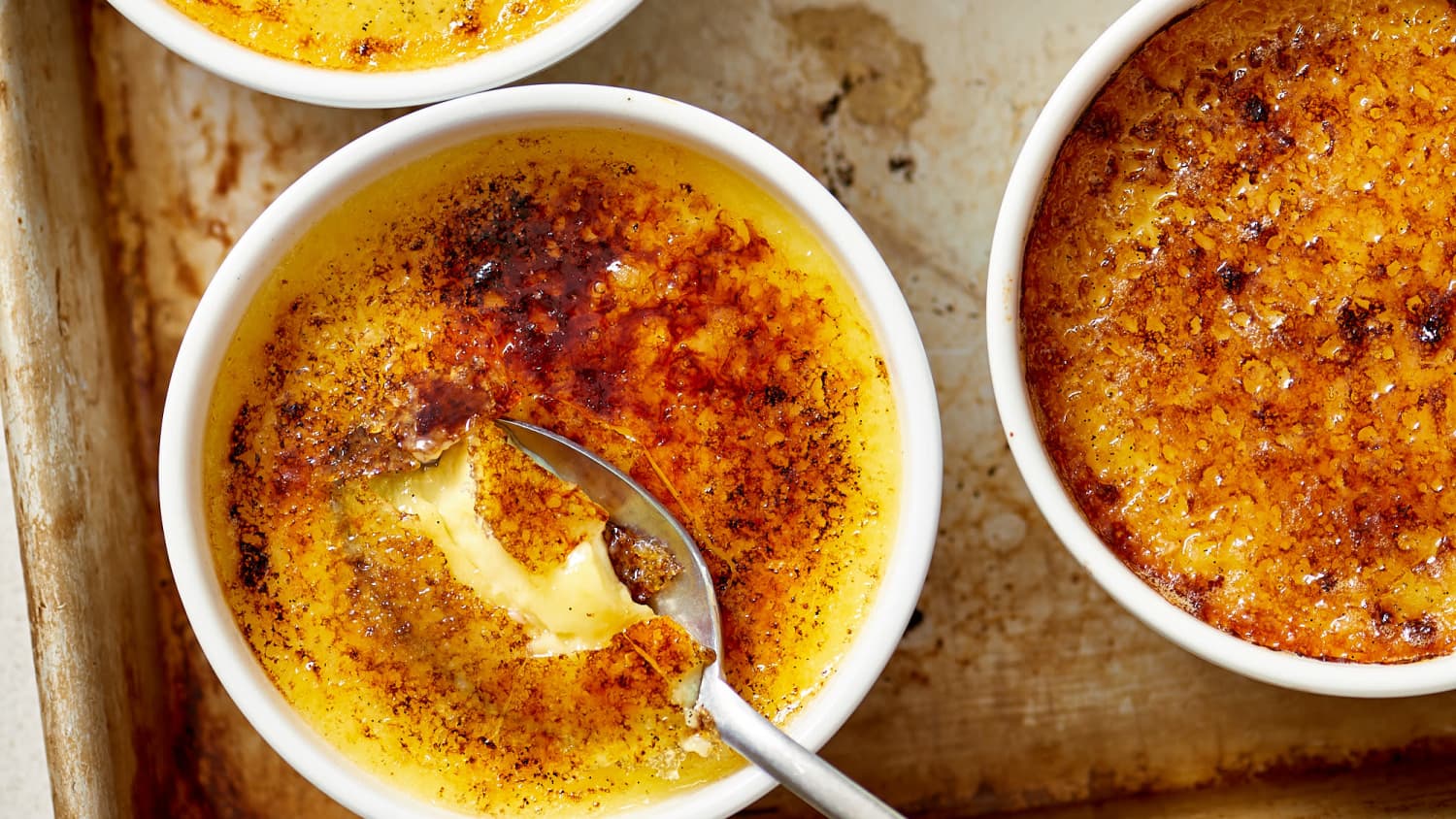How To Make Crème Brûlée
4.4
(18)
Your folders
Your folders
Servings: 6
Cost: $2.96 /serving
Author : Faith Durand

Ingredients
Export 3 ingredients for grocery delivery
Instructions
Step 1
Heat the oven to 300°F and bring water to a boil. Heat the oven to 300°F. Meanwhile, bring about 3 cups of water to a boil on the stovetop or in an electric kettle. Place 6 (6-ounce) ramekins in a roasting pan or metal 9x13-inch baking pan.
Step 2
Make the crème brûlée custard mixture. Place the egg yolks in a medium bowl. If you are using a vanilla bean, split it lengthwise with a knife and scrape out its seeds into the bowl. Whisk the egg yolks to break them up. Add the powdered sugar and a pinch of salt, and whisk until uniform. Add a drizzle of the cream and whisk it into the egg yolk mixture to lighten it, then add the rest of the cream and whisk.
Step 3
Strain the crème brûlée custard mixture into a spouted container. Pour the mixture through a fine-mesh strainer into a pitcher or liquid measuring cup — this will make filling the custard cups easier. If using vanilla extract instead of a vanilla bean, add it now, to the strained custard.
Step 4
Divide the custard between the baking cups. Pour the custard into the prepared ramekins. Fill the ramekins as close to the edge as you can; you do not want a lot of empty space between the surface of the custard and the top rim of the ramekin.
Step 5
Add the boiling water to the baking pan. Place the baking dish on the rack in the preheated oven, and pour the boiling water into the baking dish around the ramekins, being careful not to let any water splash into the ramekins.
Step 6
Bake the crème brûlée for 45 to 60 minutes. The depth of the ramekins will determine how long it takes for the custards to bake. When using very shallow dishes, with the custard less than 1 inch deep, bake for about 30 minutes. When the dishes are narrower and taller, with the custard about 2 inches deep, bake for at least 50 minutes, and up to 60.
Step 7
How to know when the custard is done. The custard will be quite wobbly; it should jiggle from side to side when nudged. However, it should not be liquid in the center. It will be barely set, but not liquid. The custard will firm up considerably in the refrigerator, so take it out of the oven when it has set into that very-jiggly-not-liquid consistency.
Step 8
Remove the crème brûlées from the water bath and chill. Use tongs to remove the crème brûlées from the water bath to a rimmed baking sheet. Let them cool for about 5 minutes, then refrigerate for at least 30 minutes or until ready to serve.
Step 9
Prepare the crème brûlées for brûlée. When ready to make the sugar crust, take the ramekins out of the refrigerator. Gently dab the tops with paper towels to remove any moisture or condensation. Even sprinkle the tops with a fine layer of granulated sugar The key here is for the sugar layer to be of even thickness. Shake the ramekins back and forth to distribute the sugar evenly. Tap out any excess sugar; you should be able to almost see the custard through the thin layer of sugar.
Step 10
Brûlée the crème brûlées with the broiler. Arrange a rack in the oven in the highest position. Place the ramekins on the rack and turn on the broiler. Broil for 5 to 10 minutes, rotating them frequently so that they broil evenly. Take them out when they are golden brown and bubbling.
Step 11
Refrigerate the crème brûlées again or serve warm. It is traditional for crème brûlées to be served cold. If you like it cold, place the ramekins back in the refrigerator. They can be refrigerated for about 30 to 45 minutes before serving (no longer, otherwise the sugar crust may begin to soften). If, however, you like them lukewarm in the center, as I do, you may serve them after the sugar has set (about 5 minutes).